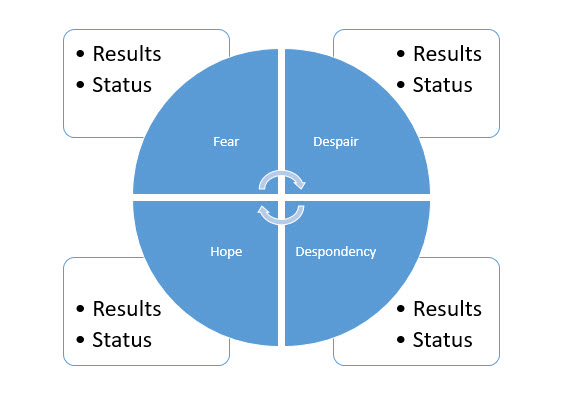Next, if the doubt involved in these affects is removed, hope becomes confidence and fear, despair – namely, a joy or sadness which has arisen from the image of the thing we feared or hoped for. (Spinoza, 1994a, pp. 81, P18 Schol. 2)
Despondency is thinking less highly of oneself than is just, out of sadness (pp. 108, D XXIX)

Despair is a sadness born of the idea of a future or past thing, concerning which the cause of doubting has been removed. (Spinoza, 1994a, pp. 106, D. XV)
Students’ Experience of Despair
I think a strange passivity comes over despairing children. It is usually preceded by moments of extreme anger, hope and fear; once a student has realised that there is nothing to be done, that there is no hope that they will benefit from being in school, no hope that they might learn anything which they perceive to be worthwhile, they can “give up”. The fight goes. This is a strange form of death I think. It makes me wonder just how many students are in states of “despair”. Such students may well be perfectly well-behaved but ultimately totally disengaged. I think the system sends a great many signals to students that they are not going to make it in the form of bad exam results, in the inattentive and uncaring looks from parents/teachers/students etc., in the inaccessibility of the work that they have been given to do.

My diagram is attempting to give an adequate idea of the ways in which the system produces despairing learners. In my view, often “despairing cultures” – cultures which feel abandoned economically and culturally from the “mainstream” – produce initially “despairing learners” in the form of young children who are frightened by a system which they have inadequate resources (economic, cultural, psychological) to deal with the issues that the school throws at them. This despair turns to despondency when they realise that they will never succeed in the school system; the resources that they have been given become “redundant” – totally useless and meaningless – and they feel alienated. They are despondent because their estimation of themselves is completely unjust; they have not gleaned a fair assessment of their abilities.
A Teacher’s Experience of Despair
In some ways, despair is a nicer emotion to feel than fear. I can think in my career when I have felt very fearful about the fact that I was teaching classes quite badly, I would, in my mind, give up the “hope” that I could actually help them learn anything meaningful, and, as a result, I stopped feeling the “inconstant sadness” about a “doubtful outcome”, and would instead just feel that there was no doubt that they were learning nothing in my charge. Despair took hold of me. It was a curiously restful emotion to feel; there was no longer any point in “trying” to help students learn; my task became purely to “control” my pupils, keep them busy, keep them quiet. I think my students recognised the affect of despair in me, and liked me all the more for it; I had stopped making demands on them, I had stopped checking that they’ve done their homework, I’d stopped marking their work in detail beyond doing what was absolutely necessary to keep my managers off my back, I’d entered a rather Zen-like state of professional despair. I had no expectations any more. I think my students recognised this affect in me because I think many teachers are in states of “despair”; while they might pay lip service to extracting the best results they can from their students, they have secretly made their peace with the fact that their students are learning very little in their lessons. The hope and joy has gone.
Ironically, these states of despair have had the effect of making me feel despondent in a Spinozist sense – thinking less highly of myself than was just. This realisation that I was better at my job than I had previously thought I was frequently had the effect of lifting me out of the despair, and bringing new hope that I might be able to help my students.

This diagram shows the affective cycle that I underwent as a teacher when trying to deal with classes whose results and learning I felt I could not adequately “mould”, or “control”, or “nurture”. It starts with fear or hope depending upon your state of mind, and then moves to despair, which creates a calm despondency that then nurtures hope, which eventually leads back to fear. In the current climate, the constant issues to deal are “results” and “status”, which produce this affective cycle.

